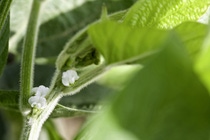Media
Joint News Release
LIMBURGERHOF, GERMANY and MOSHAV SHARONA, ISRAEL, July 17, 2017 -- BASF, the world’s leading chemical company, and Kaiima Bio-Agritech, a genetics and breeding technology company, today announced their collaboration for the discovery of novel herbicide resistance traits to develop new weed control systems to improve farmer productivity.
This multi-year project will leverage Kaiima’s proprietary EP™ technology platform, a non-GMO breeding tool that enhances plant performance by inducing novel diversity within the genome, using the plant’s own DNA. EP™ can create forms of genetic modifications, such as gene duplications and translocations, which are largely unattainable through other mutagenesis approaches. The technology works with all major crops and plant species. Kaiima will also utilize its genomics expertise to identify modifications responsible for the new trait.
BASF, which has a broad and diverse herbicide portfolio, will provide its extensive knowledge in herbicide application and formulation, as well as precision testing capabilities. The company will also work closely with Kaiima on discovery validation.
“The ability to make specific edits to targeted genes has sparked industry-wide interest in implementing gene editing techniques to create novel traits,” explained Kevin Cook, CTO of Kaiima. “However, often the gene systems that regulate targeted traits are unknown. EP™ is a unique technology platform for addressing these cases because it is unconstrained by a need for specific biochemical pathway knowledge to create desired traits.”
“Having already commercialized advanced weed control systems such as Clearfield®, BASF is an ideal partner,” said Rick Greubel, CEO of Kaiima. “BASF also possesses a leading portfolio of seed technologies that boost product efficacy and amplify production efficiency, which creates a potential pipeline of future collaboration projects.”
“We are constantly looking for technologies to complement our vast agronomic expertise. Kaiima has unique capabilities that will help us to identify new non-GM herbicide traits and broaden our portfolio of weed management solutions,” added Harald Rang, Senior Vice President, Global Research and Development Crop Protection, BASF. “We see our strategic partnership with Kaiima as a great opportunity to develop new herbicide solutions, helping farmers increase yield and crop quality.”
BASF Media Contact:
Betsy Arnone
Phone: +1 973 245-7865
Email: betsy.arnone@basf.com
Kaiima Media Contact:
Avi Maidenberg
Phone: +972 4 953 0148
Email: avi@kaiima.com
About BASF
At BASF, we create chemistry for a sustainable future. We combine economic success with environmental protection and social responsibility. The approximately 114,000 employees in the BASF Group work on contributing to the success of our customers in nearly all sectors and almost every country in the world. Our portfolio is organized into five segments: Chemicals, Performance Products, Functional Materials & Solutions, Agricultural Solutions and Oil & Gas. BASF generated sales of about €58 billion in 2016. BASF shares are traded on the stock exchanges in Frankfurt (BAS), London (BFA) and Zurich (BAS). Further information at www.basf.com.
About Kaiima
Kaiima Bio-Agritech is a plant genetics and technology company that has developed a proprietary technology platform called EP™. EP™ is a new breeding tool that can enhance plant performance by inducing novel diversity within the genome, using the plant’s own DNA. The technology works with all major crops and plant species. Kaiima collaborates with leading multinational and regional seed companies to apply its EP™ technology to their elite germplasm. To learn more about Kaiima, please visit www.kaiima.com.
P-17-267

